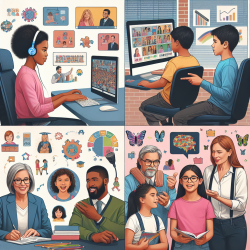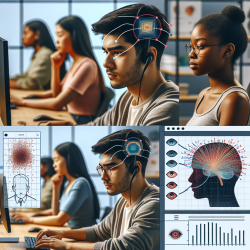Enhancing Online Counseling Skills: Insights from Cutting-Edge Research

The COVID-19 pandemic has necessitated a rapid shift from face-to-face counseling to online modalities. For practitioners looking to enhance their online counseling skills, understanding the precursors of openness to online counseling is crucial. A recent study, "Precursors of Openness to Provide Online Counseling: The Role of Future Thinking, Creativity, and Innovative Behavior of Future Online Therapists," offers valuable insights into the personal characteristics that influence a therapist's willingness to provide online counseling.
Key Findings
The study identifies several key factors that contribute to a therapist's openness to online counseling:
- Preference for Online Social Interaction: Therapists who are comfortable expressing emotions online are more likely to see the benefits of online counseling and are more open to providing it.
- Perceived Emotional Expressiveness: Those who recognize the emotional expressiveness advantages of online counseling, such as the use of emojis and stickers, are more open to conducting online sessions.
- Innovative Behavior: Therapists who exhibit innovative behavior are more adaptable and open to online counseling.
- Perceived Creativity: Creative individuals are more likely to see the emotional expressiveness advantages of online counseling and are more open to providing it.
- Future Problem-Solving Thinking: Awareness of future problems and ways to solve them enhances both creativity and innovative behavior, contributing to a greater openness to online counseling.
Practical Implications
These findings suggest that training programs for future therapists should include modules that enhance these key characteristics:
- Encourage Online Emotional Expressiveness: Incorporate exercises that allow therapists to practice expressing emotions online, using tools like emojis and stickers.
- Foster Innovation: Develop activities that promote innovative thinking and adaptability, crucial for navigating the challenges of online counseling.
- Enhance Creativity: Include creative problem-solving exercises that help therapists think outside the box and develop unique solutions for online counseling scenarios.
- Future Problem-Solving: Implement future problem-solving techniques in training programs to help therapists anticipate and address potential challenges in online counseling.
By focusing on these areas, therapists can become more comfortable and effective in providing online counseling, ultimately leading to better outcomes for their clients.To read the original research paper, please follow this link:
Precursors of Openness to Provide Online Counseling: The Role of Future Thinking, Creativity, and Innovative Behavior of Future Online Therapists.
Citation: Alt, D., Boniel-Nissim, M., Naamati-Schneider, L., & Meirovich, A. (2022). Precursors of Openness to Provide Online Counseling: The Role of Future Thinking, Creativity, and Innovative Behavior of Future Online Therapists. Frontiers in Psychology, 13, 848235. https://doi.org/10.3389/fpsyg.2022.848235










